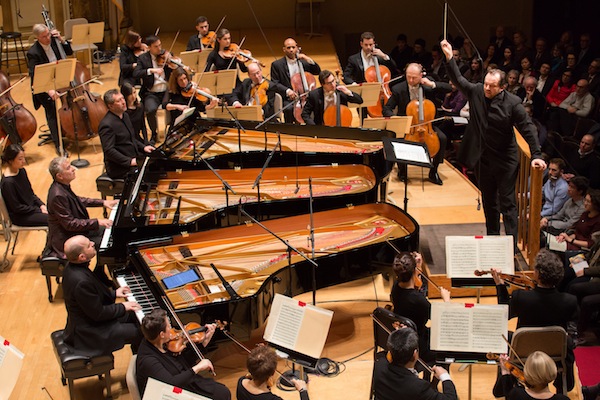Leipzig comes to Boston in Nelsons’ unique BSO program

Kirill Gerstein, Jean-Yves Thibaudet, and Thomas Adès performed Bach’s Concerto for Three Keyboards with Andris Nelsons conducting the BSO Thursday night. Photo: Michael Blanchard
Two cities with rich musical histories are now sharing the same conductor.
This month, Andris Nelsons begins his new position as Kapellmeister of the Leipzig Gewandhaus Orchestra, a post he will hold in conjunction with the directorship of the Boston Symphony Orchestra. To fête the event, both cities have entered into a unique cultural exchange. For one week this season, each orchestra will perform works popularized by the other as a way of paying homage to their respective musical legacies.
Both cities have, in their own ways, marked the history of music with important premieres. The Boston Symphony Orchestra brought Stravinsky’s Symphony of Psalms, Bartók’s Concerto for Orchestra, and Hindemith’s Konzertmusik into the world, and the Gewandhaus Orchestra offered the first performances of Beethoven’s Emperor Concerto, Brahms’ Violin Concerto, and three of Schumann’s four symphonies, among others.
Thursday night at Symphony Hall, as part of Leipzig Week in Boston, Nelsons led the BSO in a zesty German program that cast light upon two of Leipzig’s most important musical citizens, Robert Schumann and Felix Mendelssohn.
But new music is also part of the Boston-Leipzig alliance, and Thursday night witnessed the world premiere of a new work by Sean Shepherd.
Shepherd’s Express Abstractionism, a co-commission from the BSO and Gewandhaus Orchestra, is a colorful, four-movement musical canvas that evokes the styles of five abstract painters: Lee Krasner, Gerhardt Richter, Alexander Calder, Wassily Kandinsky, and Piet Mondrian. Throughout its fourteen-minute length, the work moves from searching calm to blazing intensity. The opening movements unfold in whiffs of phrases. Strings shimmer, wood blocks and drums rumble, and a cooing English horn lines rises to the surface before dying away.
But like the music of Shepherd’s teacher Steven Stucky, the short symphony casts an eye towards the past, and the work reflects the styles of other composers. Thick, Rochbergian sonorities growl in the second and third movements, and the final movement glows with silvery, almost Copland-esque chords.
Ultimately, the work is a symphonic collage all Shepherd’s own, and his music effectively builds from gestural phrases to powerful climactic moments. Nelsons led an incisive reading of the score to make a strong case for Shepherd and his music.
The solo spotlight fell upon three distinguished pianists Thursday night. Kirill Gerstein, Jean-Yves Thibaudet, and Thomas Adès, all popular figures with the BSO these days, who delivered a bracing account of Bach’s Concerto for Three Keyboards in D minor, BWV 1063.
The concerto was the first of Bach’s works to be performed by the Gewandhaus Orchestra. Its ensemble premiere in 1835 even involved such musical luminaries as Clara Schumann and Mendelssohn.
In the hands of Gerstein, Thibaudet, and Adès, Bach’s music resonated with the buoyancy and lyricism so integral to the composer’s high-Baroque style. Gerstein was often the leader, shaping the trickling phrases with clarity and deep, pearly tone. In the dance-like second movement, Gerstein shaded the lilting melody with songlike grace. Thibaudet took over with playing of bright tone and crispness, while Adès supplied soft though sturdy continuo support.
In the outer movements, the three pianists wove a silvery tapestry of sound, taking time to shade the music with bold dynamics. Nelsons proved a sensitive partner and conjured warm, glowing accompaniment from the strings.
Similarly, Nelsons’ reading of Mendelssohn’s Symphony No. 3 in A minor moved with clear direction and momentum.
Titled the “Scottish,” the work was actually the fifth and final of Mendelssohn’s mature symphonies. Its four movements brim with pathos, though its wind phrases peak out of Mendelssohn’s clear textures like sunshine through clouds.
As is often the case with Nelsons’ performances, details were aplenty. The burbling clarinet solo of the second movement, played dexterously by William R. Hudgins, blossomed to encompass the full ensemble. In the symphony’s dark opening, Nelsons drew out a radiant cello phrase.
In the outer movements, Nelsons’ tempos tended to be on the slow side, but the conductor managed to keep an eye to the work’s architecture. Though the first movement is marked Allegro agitato, Nelsons sculpted the first theme in smooth phrases, treating the ensuing agitated passages as a goal to be reached. The Adagio was especially beautiful as Nelsons crafted the phrases in long vocal arcs. The fiery finale had enough bite and precision to bring Mendelssohn’s stirring score to a grand conclusion.
Rounding out the program were two choral works by Schumann. His Neujahrslied, Op. 144 treats the coming year with urgency and religious reverence, and the gorgeous Nachtlied, Op. 108 beams with a tranquility that looks ahead to Mahler.
The Tanglewood Festival Chorus sang with crisp diction and plush corporate blend. The fugal statements of “Lernt Sicheln zu schliefen” culminated in gleaming towers of harmony in the Neujahrslied. The concluding hymn “Nun danket alle Gott” soared over the orchestra in powerful statements.
Baritone David Kravitz was a superb soloist, singing his passages with bronze tone and conviction. These were the BSO’s first performances of these luminous works, and Thursday’s fine singing will linger in memory.
The program will be repeated 8 p.m. Saturday. The Bach, Shepherd, and Mendelssohn will be performed 8 p.m. Friday at Symphony Hall.
Leipzig week in Boston will conclude 3 p.m. Sunday at Symphony Hall where the Boston Symphony Chamber Players team up with the Gewandhaus-Quartett for music by Ligeti, Foss, Haydn, and Mendelssohn. bso.org; 888-266-1200
Posted in Performances